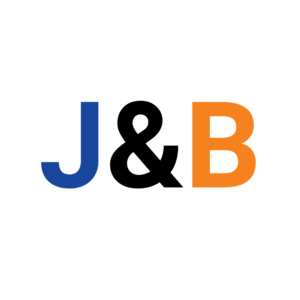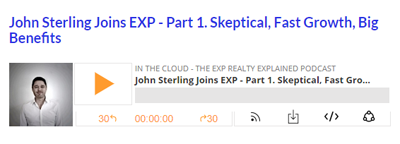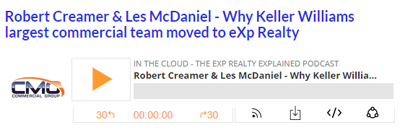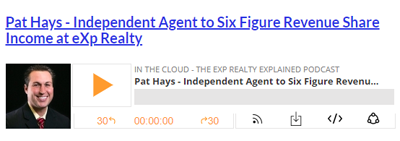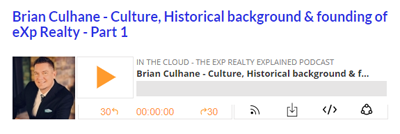John Sterling Joins EXP - Part 1. Skeptical, Fast Growth, Big Benefits
Joining us today is John Sterling. John’s been in a number of markets and was previously with Keller Williams and most recently was in San Francisco California and is currently in Colorado. John’s background is fairly extensive in real estate. John is known for his work in Europe and London as well as working with multiple team leaders and market centers and helping them attract agents. John talks at length about his challenges in real estate and really not really getting EXP at first. John I’ll give you his insight in terms of why he ultimately moved from Keller Williams to EXP and he hasn’t regretted it and never looked back.
Learn More about eXp Realty – Click here to watch a quick 7 Minute Intro Video.
Remember our disclaimer: The materials and content discussed within this podcast are the opinions of Kevin Cottrell and/or the guests interviewed. This information is intended as general information only for listeners of the podcast. Listeners should conduct their own due diligence and research before making any business decisions. This podcast is produced completely independently of eXp Realty and is not endorsed, funded or otherwise supported by eXp Realty directly or indirectly.
- Why EXP is growing fast
- Why Successful independent brokerages partnering with EXP
- Keep your Brand, grow your income with EXP
- Big benefits of being at EXP
- Earning publicly held stock. EXP listed on Nasdaq
- EXP innovating and game changing technology made simple
Stay tuned for Part 2
Transcription
Kevin: Welcome back to another episode of the EXP explained podcast. I’m joined today by special guest John Sterling. John’s been in a number of markets. He was previously with Keller Williams and most recently was in San Francisco California and is currently in Colorado. John’s background is fairly extensive in real estate. He and I met years and years ago when I was a team leader at Keller Williams and he was doing some leadership expansion and attraction of agents. Certainly if you’re listening to this and you’re from Keller Williams you’re more than likely will know John from his work in Europe and London as well as working with multiple team leaders and market centers and helping them attract agents. John talks at length in my interview about his challenges in real estate and really not really getting EXP at first. So if you’re a little bit skeptical and you want to hear from somebody who was right there where you were dug into it didn’t pay attention to the rumors and misinformation in the market and did quite a bit of due diligence over about 15 months. John I’ll give you his insight in terms of why he ultimately moved from Keller Williams to EXP and he hasn’t regretted it and never looked back. Stay tuned for my interview with John Sterling.
Kevin: Welcome to the show John.
John: Hey thanks for having me. Happy to be here.
Kevin: I’m looking forward to it. We are reunited again and I’m sure we’ll get into a lot of that on the conversation today but before we do for people listen to the podcast that maybe you aren’t familiar with your background and history and real estate and all that you’ve done. What did you take a couple minutes and just give a little bit of your highlights in terms of some of the stuff you’ve done. Because I’ve known you a long time and I know you’ve accomplished a lot.
John: Oh well thank you. Yeah I’ll keep it short and sweet. So I started my real estate career in Chicago back in 2002 it was with a traditional firm then they had a great training program. So I got up and running very quickly. There were some changes there so I went off and started my own brokerage after about two years and then eventually merged that with Keller Williams back in 2004. My time at Keller Williams was mostly spent opening up new offices and markets where we didn’t have them. And most of that work was before the financial crash and after the crash I was the guy who would go fix these struggling offices. So it involved a lot of moving. So I got to go all over the US and then even opened up our London office. So I was in the UK for two years. Packed my flat on Brexit vote day and came back to the U.S. and had been engaged in real estate and just sales in San Francisco and Denver ever since.
Kevin: Fantastic. And you’re very modest. I mean I first ran into you I probably was about two thousand five or six when I was in St. Lewis with Keller Williams And you were part of the group that was essentially acquiring market centers and expanding and you guys were rocking and rolling and obviously lots changed for everybody after the market shifted. I was excited and it was a long very detailed due diligence process before you moved over to EXP you and I had conversations over I don’t know probably 15 months or so. And I think for people listening because the whole genesis for this podcast is to allow people you know it doesn’t have to just be a Keller Williams but people that run their real estate business like a business and are seeing all of these agents like you were changing brokerages and coming over to EXP. I remember like you like everybody else had healthy skepticism. You wanted to understand it you were from the outside you were part of a gigantic franchise system and there was a lot of misinformation and noise out there in the marketplace. What is it that you learned that really caused you to start to shift your mindset and say I need to dig into this further.
John: That’s a good question. As you mentioned you know it was a long process for me it wasn’t an overnight type of thing and I’d been paying attention to EXP for a long time. In fact I remember when Glenn the CEO was with Keller Williams back in the late 2000s and he left the start yet. And it was you know I just thought it was an interesting move and I was doing some unique things in the business but didn’t really give it much thought. I was happy. Keller Williams still think they’re an amazing organization. So I don’t have any you know any issues with Keller Williams. It seemed like a better opportunity and fit for the future that I want to create and kind of where the business is headed so the things that got my attention over the past few months and ultimately led me to making the move is that you know I had ignored EXP for a long time as you mentioned a lot of people do this. And the people I’ve talked to who are in the process of joining you know people who are my friends who never would have given it a second glance if it wasn’t me calling. You know it was or someone else. The gist of it was there is a lot like you said misinformation or half truth is I’d like to explain it which is understandable. You know it’s like EXP has come out of nowhere. I have never seen growth like this in the real estate business and I was with Katie when I early days when it was growing like crazy. But even they didn’t see growth. This is great. So there’s just a lot of fear from the incumbents that they’re going to get squashed because if he keeps up this pace then they’re going to have some serious problems.
Kevin: So it is interesting I want to touch on one point because that is something that you know you hear the comments of well they can’t keep up growth at this pace or I can’t believe they’re growing that fast or there’s no way they could be growing that fast. And I’m going to touch on something in the franchise system you know there’s very well Gene Frederic knows it well I know well we’ll come out of the same franchise system when somebody goes to expand a franchise system, this is for listeners to understand and why EXP can sand grow so much quicker. I’m going to contrast the two let’s say that John and I are in the franchise system and we decide we’re going to open up an office in Palo Alto California and we get a conversation going with a great great huge player hugely influential big producer and the producer says hey John and Kevin I’m ready to join. I want to do something with you. How do we get started in Palo Alto. And that starts the clock in the process right. And they have to go through the approval process and there’s a whole bunch of steps involved in the point that I’m making here is from that conversation assuming you get some sort of a green light go I’m willing to do it. There are steps like getting an investor getting it approved getting the franchise awarded in the net net on it is on average it’s 14 to 18 months before mega agent key influencer walks in the door of an office or can announce that they’re part of that Palo Alto location hypothetically. Now when John and Kevin have a conversation with that same agent in Palo Alto. And assuming they’re excited about the EXP and they due to due diligence. We’re having them change brokerages in as fast as 10 days. I mean you listen to Brent Gove’s interview. He made the decision in 10 days or less with one hundred and fifty million dollar team. It’s unheard of. In the franchise systems. Now the follow on to that is when like we had in San Diego we had Daniel beer Carl Wessel and Mary Maloney and all of the others joined in it like a really short 10 day period EXP because they’re influential has tons and tons of agents joined after it. So for somebody and I want to get your perspective on this from the outside we you’re seeing these mega numbers of agents right. You know a thousand plus fifteen hundred plus agents a month and you are. In the franchise mindset or a bricks and mortar mindset where you’re used to being in a physical location. Many many people. And this is why I think that they talk about this. Not being sustainable. Look at it and go. There’s no way they’re going that fast. We never did. We can’t. How can they. And I think that that’s the driver is John and I can go out and have hundreds if not thousands of conversations as well as every other agent that EXP. And if somebody says go. It’s like when you say go it wasn’t very long before you were alive and over at EXP. You actually were waiting for some things. To occur in your business world. But from the process where you’re like OK good. I’m ready to go. It was fairly quick. It wasn’t like the franchise world.
John: Yes. All of that’s true. Interestingly enough probably the most fascinating part to me is the large number of independent brokerages so they’re not affiliated with any franchise or big regional company. You know he could be one person or a few dozen agents. You know it’s typically the size of these things of those types of organizations that are going to need EXP. That was eye opener for me too because it’s a fairly common thing in our business for people to get a little experience and then decide they’d like to be their own boss. They want to be their own broker so they leave the company that they started with they got some training or whatever else they’re no longer working under someone else’s brand they start their own. So it happens all the time. So the fascinating part is how many people have gone through that process achieve their independence so they have their own business with their own branding and their boss their names above the door. I can tell everyone in our neighborhood that they own the company and they’re still coming to EXP. So they are profitable businesses that are doing well. They’re helping businesses that are growing. Everybody’s happy. And even with all that they’re still choosing to partner with EXP. So they just see that there is more value with EXP you know from a small item I’d have to pay every year through their split the system was just good for agents at any level. But it’s the big winners are the ones who were showing up with teams which are essentially you know they could be standalone brokerages but these big agent teams are like you mentioned they’re moving very fast. Then you have the small brokerages who are looking for some more leverage because if you’re a brokerage that has 20 or 30 agents you’re probably still selling right. It’s probably not making enough from the agents splits in order to support yourself. You’re probably still selling yourself. So that’s just a lot of work. Like you have to manage all these people and you have to do your own business well with the EXP you get to leverage a lot of the stuff that’s already built in for very low costs. You can send your agents the training or bird virtual campus any time you are reading online. You can then go hire more people because you don’t have to babysit them all day like there’s no 30 or 40 training events we have every week. I don’t think you can just sit down in front of the computer and say OK here are the training you need to go to go to these and come to me with questions. It’s much more leverage and just a much better way to scale. So that was an interesting thing that I discovered just as I paid attention to all the people who kept showing up.
Kevin: So absolutely and one of the things just to echo what you’re saying and this is happening all the time in fact there’s one by the time this goes live that’s in the Dallas Fort Worth metro. They have ninety five agents. They’re an independent and you know the model is almost this hybrid model which we’re seeing pop up more and more where the broker/rainmaker is a weather pick your flavor. Right. Zillow preferred or premier whatever the program is and they feed their agents. And so the lead gen side they’ve got wired right they might be spending one hundred thousand dollars a month in this case. And what was interesting is she was so excited about EXP. Her biggest concern is I don’t know if this is going to translate throughout my key people right? My leaders within my office and then the agents downstream. And what was interesting is Gene and the leaders were in town meeting with this Rainmaker and the key people and he called me yesterday afternoon and his conversation is “I only stayed half a day because they all get it. I met with a handful of people”. I talked to him again this morning and he said we’re done all ninety five or come and they’re just basically working on the onboarding process with ninety five agents making sure everybody’s applications and the revenue share piece is set up correctly. That is the wave of the future. I mean I’ve talked with people within the company they’re talking to 25 agents smaller brokers and the driver for that. And if you think about the NRA numbers 55% of the agents aren’t independents right. It’s the biggest piece. We spent a lot of time talking about franchise systems. They’re more in franchise system likes to tout that they’re number one but you had the agents that are at independence. It’s way bigger than they are. And so when you look at the opportunity this is the next big wave that’s occurring. And you talk to these broker owners I’m talking to some in the United States in the southeast U.S. And the number one thing they say is they love being producers. They love mentoring and training agents. They love the Legion and helping people in the case of this this gal in the Dallas Fort Worth area. She’ll be on the podcast shortly but what she’s going to tell you is I don’t like being a broker. I’d rather be brokered by EXP get out of compliance get all the systems and all of the things in place and just go do what we do well the brokerage stuff is not sexy. The brokerage stuff is not fun. The compliance stuff nobody enjoys. Previous to EXP it’s been the necessity right. You didn’t have somebody that said hey keep your brand keep your look and feel. Go do what you do well and then we’ll take over all the other stuff.
John: So it really is the best of all worlds. And I think that’s really I mean just spending years and years…. I mean all again all over the US and even in Europe. One of the hardest things to overcome when you’re having conversations with people about joining your company is it’s really just ego. They like that their name is above the door. They like to tell everyone in their world that they own the company and the fact that that’s happening at EXP is very telling. We’ve overcome that objection. You know people are like oh it’s like well I could still on my company. It’s just kind of you know using some of the EXP stuff too which is great. I mean this is it’s a huge advantage for us just because it’s you know the more or people show up the more examples we have to point to and say See we told you everything worked just fine except you’re you’re growing faster and you have fewer headaches.
Kevin: Yeah. You know and part of what you did John is you talk to over the course of when you talked about turning around market centers and moving around there was a long period of time where I consider you a non team leader Team Leader. In other words you were having conversations with hundreds if not thousands of agents but virtually on the phone at conferences. So you’ve got a pretty good basically a take on mindset of agents. You personally were responsible for many many agents that went into Keller Williams When you look at this.
John: You wanna know my number?
Kevin: Yeah What is your number? I was going to ask you next.
John: I had my office lady look it up before I left Keller Williams. I directly recruited sponsors like brought to the company just me but named me as the reason they were with Keller Williams one hundred and sixty two before I left. And there were many many more of those that like top of a hundred sixty two that I recruited on behalf of other people because that was my job right. So it was really just a hundred sixty two that I found on my own. And then as you know it’s like hundreds or like you said I don’t know how we’d be able to tabulate that but we’ll just say north of a thousand.
Kevin: You’ve got a great take on this you know so enjoining EXP and you know coming from a franchise system. If I’m an agent. Whether I’m a rainmaker on individual age a mega agent and I’m an expansion agent that’s thinking about this. What are the two or three things that you think that. You learned about it that if you were on the phone with these people going forward you would say you really have a couple of options you could go to a franchise system or you go to EXP. And here are the big benefits of being at the EXP.
John: Yep that’s a good question. So if I had to put it in bullet form first the money has to work right. You know it’s a Financial decision this is a business like we’re in business to make money. So we do other things too. There could be a bigger purpose for our you know working in real estate but like the math has to work. So the. That was a good thing for me because you look at EXP everybody is on an 80 20 split the 20 percent caps at sixteen thousand dollars a year no matter where you are compared to my San Francisco office with Keller Williams where I was paying fifty thousand dollars she here is a cap. I mean that alone by you know in two hundred eighty dollars a month in an office these you know it’s just a huge expense to be there now. Sounds like you don’t have to do to any deals the same let’s go to cap but still like I can have that same environments like comparable stuff or even better tools and only pay sixteen thousand here. So that seemed like a much better deal to me. So that was part of that. There’s you know a small transaction fee after the after the sixteen thousand but it’s nothing substantial nothing to worry about. In addition to that there are certain ways you can earn a publicly traded stock. So it’s not privately held. There’s not a king of EXP it’s all up it’s on the Nasdaq. It’s a publicly traded company. So for longtime I guess it’s a good side note just as far as this goes that EXP was traded on the OTC exchange. So it’s just another stock exchange out there. But the trick with that is that it’s there’s not as much liquidity because it’s not like you know we’ll call Big Boy exchanges. So really it’s like you got to be a publicly traded company you want to be on one of the big exchanges in the US. That’s the New York Stock Exchange with the Nasdaq. I go to the two that are reputable and that’s where you want to be. So earlier this year another sort of catalyst to me opening up the conversation to joining. Was when EXP was Listed as what they call it. You get up listed to the Nasdaq. So they went off the OTC. Exchange and onto the Nasdaq. You don’t get to do that just by choice. I mean you have to be performing well and behaving well and. Know. The analysts and everybody else has to be compliance people the FCC everybody has to. Agree that everything is legit. So I like that. I like that there is some third [arty accountability to everything that we do. Versus you know it’s like we have it we have a board of directors into the people on the board of directors are agents that real estate people so they’re not just the financial types and the bean counters that you would find them on a traditional board of directors. So when the board of directors of stock analysts and all those people get involved. You know there’s some accountability. Versus when you have a company controlled by essentially one person. There’s not. Any real accountability I have no piece of ownership and that’s I’m contrasting with where I came from. And it’s more of a dictatorial sort of environments. So. You know being able to earn stock being able to purchase stock at a discount. I mean. The portion of my commission checks can go toward purchasing. This publicly traded stock and I get it at a 20 percent discount. So basically every deal that I do I’m getting a 20 percent gift from the EXP. It’s like I mean you know it’s like if you invest in stocks like 8 to 10% consider pretty great. So if I’m getting an instant 20% regardless of how the stock performs feels like likely going to continue to grow then that’s good news for me. So those were the big financial components. Oh and then I almost forgot the getting into technology which I’ll come back to in a second but the Web sites that we get I mean these are some of the best lead generation sites you can get for your business. We work with Konversion. You don’t know them check them out. I think last time I looked to their retail prices were a thousand dollars to set up and then 500 a month just for the system and then you have to pay ads and everything on top of that. But at EXP that’s all included in the 50 dollar month technology fee. So it’s a 500 a month I’m paying 50 a month. So you don’t like anything else about the EXP or you don’t care about revenue share and you’ll care about the training you care about the virtual world. If you don’t want to do your own business whatever you could make an argument that it’s just the Web site by itself basically pay for your affiliate vision with the EXP if you want to do any of the rest like you’re going to stumble across other great thing that you expected. I’d like that by itself is a good enough argument to make the move so. So that was the money piece as far as the technology goes so we’ll continue that thread just for a little background there. I’ve been involved with tech startups as both an adviser like a formal advisor and an investor for years. In fact I looked it up the first one that I did was back in 2007 was a property portal that was competing with like Zillow to really realtor dot com didn’t make it as far as those guys did just it was funding and leadership and whatever else. But you learn a lot through that process. A lot of people understand kind of the dynamics. So I’m very comfortable vetting technology and more importantly not just the technology it’s the teams working on the technology real estate in general as an industry as a late adopter for most technology things even today. So for example there’s a zip code valuation thing that’s clogging my Facebook timeline right now with people asking their clients you send me your zip code I’ll give you a valuation. Well that technology has been around for about 10 years now for many years. I was a customer of the company that developed first just as a real time market valuation estimates are now 10 years later everyone’s acting like it’s some revolutionary thing. You know.. Give me break… it you know if it’s fancy tech that’s going to disrupt the industry and that’s the fancy tech then there’s not much concern for me that like that’s what I’m competing with. So going back to the teams that worked with technologies I mean the technology itself is great. It’s like there’s the wonderful stuff I get to use. Everything works fine. I have to worry about it like of course the EXP is going to continue to expand those offerings of course are going to develop their own proprietary stuff. So right now we’re just growing so fast that you know the priority it seems to be like we need to be sure our basic system scale. So the people that are joining to get deals done right. Like we’ll worry about dressing it up later. But really the team behind the technology is the most important piece for me not just in real estate but like everywhere because technologies involving at such a rapid pace that we’re going to have to pivot we’re going to have to make changes we’re going to have to make decisions that are going to alter the sort of trajectory of the technology that’s being used and developed. And it’s like I have the full faith in the team the technology team at EXP to get that done. Again it’s like we’re not a real estate company pretending to be a tech company right. It’s like technology’s been built in from the very beginning. Right. So it’s like yes real estate sales is our focus but it’s not a sort of copycat thing after the fact. Thinking hey we need to get on this tech train. I’d like to know I’ve been tech focused from the beginning. That’s where the team’s focus has been and so with the company’s focus has been that’s been our game from the very beginning. You know I trust the team to be able to make the right decisions and keep us ahead of the curve and those sorts of things.
Kevin: A lot of people know this because I’ve mentioned it before. You know I was one of the first sites up on real geeks when Jeff Manson rolled that stuff out and S. Lewis from my team. So you know you and I are fairly tech savvy and we do this and that was a huge draw for me as well. I also find the whole post your social media and give me your zip code I’ll give you a report. This just shows that the average agent who’s wowed by that doesn’t realize that as a member of the National Association of Realtors they have an RPR account and that functionality is built in there too. So everybody has this not just the EXP agents everybody has it. So it’s fun for some of us to understand technology to kind of smile at that but you know a lot of agents are not as tech savvy and certainly when they look at the suite if you look at the you know the platform for conversion you look at the enterprise application all of the back office stuff the workplace platform and the collaborative tools. You don’t have to be super tech savvy to plug into EXP. And then again that’s another misnomer that you know this is for you know super tech savvy agents. We have plenty of agents come through the onboarding process hit the ground running and they’re like very commonly saying Wow I had no idea I could use all these tools and you know raise my hand get answers that super easy if you could use an iPhone you can use everything we have. So it’s not that big of a deal. Sorry. Or Android. For those people out there.. You know I’m not overly concerned with today’s hottest apps on stuff. Right? It’s like it’s just not really that much of a concern for me. My clients choose me because of our relationship not because of my fancy shiny tools like shiny things are going to change my relationship. It’s like Sure it might make it easier for me to keep up with all my clients. Like give me some leverage but it’s really about me and the value I provide to my clients. It’s like that’s you know that’s not going to go away. So that was the answer to the technology.

